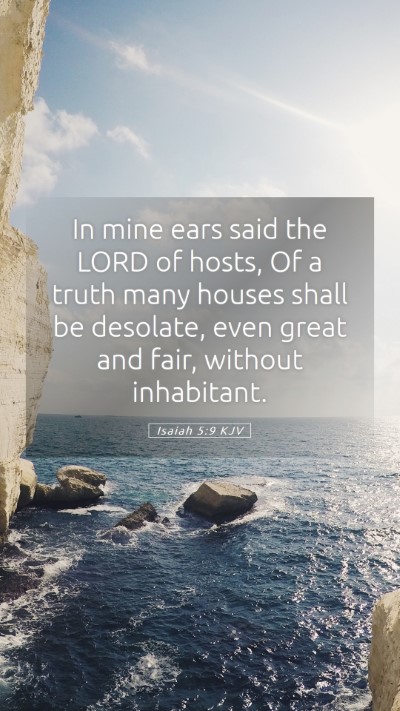Understanding Isaiah 5:9 - A Comprehensive Commentary
Isaiah 5:9 states: "In mine ears said the Lord of hosts, Of a truth many houses shall be desolate, even great and fair, without inhabitant." This verse reflects a solemn warning concerning the impending judgment God would bring upon His people for their persistent disobedience. In collaborating insights from recognized public domain commentaries, we can explore the multilayered meanings behind this verse.
General Interpretation
According to Matthew Henry, this verse serves as a prophetic declaration of desolation. The Lord speaks directly, emphasizing the reality that many affluent homes would become uninhabited. This reflects the broader theme in Isaiah concerning Israel's moral decay and divine judgment. Albert Barnes further highlights the contrast between the prosperity of the houses and the desolation that will meet them, indicating that earthly wealth cannot protect against the consequences of sin.
Spiritual Significance
Adam Clarke provides an important perspective on the spiritual implications of this desolation. He suggests that the loss of physical homes represents a larger spiritual abandonment. The abandonment occurs when the people turn their backs on God, leading to desolate hearts and lives. This imagery serves as a warning to remain faithful and accountable to God’s commandments.
Historical Context
In the context of the historical Israel, the verse reflects the socio-political and spiritual climate of the time. The wealthy inhabitants had become excessively indulgent in their material pursuits, leading to social injustice and a lack of concern for the impoverished. Understanding this historical backdrop helps in grasping the full meaning of Isaiah's lament and God's divine message.
Key Themes
- Judgment and Consequences: The verse underscores a profound biblical theme that disobedience to God results in judgment. It warns believers about the transient nature of worldly possessions.
- Spiritual Desolation: Empty houses symbolize spiritual barrenness when God is neglected, and this fosters a reflective examination of one's own spiritual state.
- The Contrast of Wealth and Spiritual Health: Material wealth can often mask spiritual poverty, prompting introspection among believers regarding their priorities.
Application of the Verse in Daily Life
When applying Isaiah 5:9 to everyday living, it compels believers to evaluate their lives concerning God’s expectations. This verse invites Christians to consider whether their pursuits align with scriptural teachings and to ensure that their homes—both physical and spiritual—are centered around God.
Discussion Points for Bible Study Groups
- What are the implications of neglecting our spiritual commitments in light of Isaiah 5:9?
- How can we ensure that our material pursuits do not overshadow our relationship with God?
- In what ways can we foster a culture of accountability within our communities?
Cross References
This verse has significant connections with other Scripture passages that reflect similar themes of judgment and desolation:
- Amos 6:11: Highlights impending judgment on those in comfortable positions.
- Micah 3:12: Foretells desolation due to injustices among God’s people.
- Lamentations 1:1: Expresses sorrow for deserted places as a result of sin.
Conclusion
Isaiah 5:9 serves as a profound reminder of the consequences of turning away from God. By weaving together insights from various public domain commentaries, we gain a deeper understanding of the implications behind its words. Acknowledging such Biblical exegesis contributes significantly to our Bible study insights and helps cultivate a culture of thoughtful reflection upon Scripture, essential for anyone seeking to deepen their biblical knowledge.


